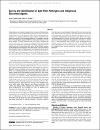Survey and identification of date palm pathogens and indigenous biocontrol agents
Date
2020-09-01Metadata
Show full item recordAbstract
Fungal diseases are considered a major threat to plant growth and productivity. However, some beneficial fungi growing in the same environment protect plants from various pathogens, either by secreting antifungal metabolites or by stimulating the host immune defense mechanism. Date palms are susceptible to several fungal pathogens. Nevertheless, information on the pathogenic fungal distribution in date palm fields across different seasons is limited, especially that from Qatar. Therefore, the current study's aim was to evaluate the pathogenic and beneficial fungal diversity and distribution, including the endophytic fungi from the date palm tissues and root-associated soil fungi, during different seasons, for the identification of indigenous biocontrol agents. Our results showed that the highest number of fungal species was isolated in fall and spring, and pathogenic fungi were isolated mainly in spring. This is the first report that in Qatar, Neodeightonia phoenicum and Thielaviopsis punctulata cause date palm root rot disease, Fusarium brachygibbosum and Fusarium equiseti cause date palm wilting, and N. phoenicum causes diplodia disease in date palm offshoots. The combinations of the fungi that did not frequently occur together in date palm rhizosphere soil were investigated to identify indigenous biocontrol agents. Based on the results, we determined that Trichoderma harzianum and Trichoderma longibrachiatum are effective antagonistic fungi against T. punctulata, N. phoenicum, F. brachygibbosum, and Fusarium solani, qualifying them as potential biocontrol agents. Antagonistic activity of endophytic fungi against the pathogens was tested; except for Ulocladium chartarum, no endophytic fungi showed antagonistic activity against the tested pathogens.
Collections
- Biological & Environmental Sciences [931 items ]
- Earth Science Cluster [216 items ]


